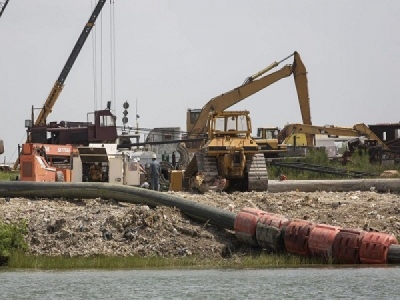
Posted on August 23, 2018
The Army Corps of Engineers said what Calhoun Port Authority Board Chairman Randy Boyd proposed violated several federal laws.
On March 23, 2015, Congressman Blake Farenthold’s staff arranged a meeting between Boyd and Corps officials to discuss Boyd’s company, RLB Contracting Inc., doing a project for the Corps on the Houston Ship Channel.
“The Congressman will be meeting with Mr. Boyd at 5 p.m. (EST) today, and he would like to assure Mr. Boyd that a meeting can be arranged,” Blake Adami, Farenthold’s legislative director, wrote to the Corps.
On March 24, Boyd contributed $5,000 to the Elect Blake Farenthold Committee, according to data from the Federal Election Commission.
On March 26, Boyd met with Col. Richard Pannell and Ed Russo. Farenthold has since said he was there as well, even though the Houston Ship Channel was not in his district. He said he left before the meeting ended.
At the time, Pannell served as the commander of the Corps’ Galveston District. Russo continues to be the deputy district engineer, overseeing projects for a district that spans 50,000 square miles of the Texas Coast from Louisiana to Mexico.
At the meeting, Boyd proposed using clay material from dock expansions along containment dikes at the Lost Lake Placement Area in the Houston Ship Channel.
When Adami wrote to the Corps after the meeting that Boyd was disappointed with how it went, Pannell penned a letter to Farenthold. In the letter, he explained that what Boyd had proposed would violate the Federal Miscellaneous Receipts Act, the Federal Acquisition Regulations and the Competition in Contracting Act and the National Enviromental Policy Act.
Basically, Pannell wrote, the Corps couldn’t accept material worth money without first giving it to the U.S. Treasury Department and allowing Congress to allocate it.
Pannell wrote that Boyd’s contract with the Corps had also expired and the Corps was required to competitively bid projects. In fact, Pannell wrote, “the proposal conflicts with planned federal dredging advertising in April 2015 and awarding in July 2015.”
“Having two different contractors working in the same placement areas at the same time creates potential liability issues,” Pannell added.
In an interview Thursday with the Victoria Advocate, Boyd described how the Corps rebuffed him as “crazy.”
Boyd said he couldn’t recall the specifics of the meeting but said he remembered trying to get a contract to do a project with a private entity.
At the end of that project, Boyd said his company would have had extra material to dispose of. Instead of disposing of it at a sand pit and passing that cost along to the private entity, he said, he proposed to the Corps using it to build levees.
“It was going to be a win-win,” Boyd said.
He said he thought because Farenthold represented him and the 27th district, he would be the “logical person to help facilitate that happening so the government could get the cost savings.”
When the Victoria Advocate learned of the meeting via a Freedom of Information Act request, it asked the Corps if a congressman and a port chairman should be lobbying for that port chairman’s company to get a federal contract.
Lt. Col. Mark Williford, a spokesman for the Corps, said the agency works to allow everyone to access Corps officials.
“Historical documents from meetings with former Rep. Farenthold and Mr. Boyd show we communicated our concerns regarding the proposed projects with the Houston Port Authority. There is no record of any contractual or financial benefit to the parties in question resulting from that meeting,” he said.
When the Advocate asked whether the Corps had any concern about entering into a contract with a dredger who also sits on a port authority board, Williford said the dredger “must still meet the same strict disclosure requirements when bidding on advertised projects.”
“Any contractual awards are solely based on an open and transparent competitive bidding process that meets federal law,” he said.
Boyd said in his interview that his company, RLB Contracting Inc., “has always been the low bidder on every contract.”
That was true when the Corps went out for bids to dredge the Matagorda Ship Channel and from the Matagorda Peninsula to Point Comfort after Hurricane Harvey. RLB beat two other bidders.
They were the Orion Marine Group, which he used to work for, and Mike Hooks. RLB was the lowest bidder. RLB’s bid was even 14.37 percent below what the government estimated the project would cost, records show.
Since then, the contract has been modified at least twice, and an additional $315,000 has been tacked onto the about $4.7 million contract.
When working on another multimillion-dollar Corps’ contract to dredge the Gulf Intracoastal Waterway and the main channel across San Antonio Bay in Calhoun and Aransas counties, RLB’s dredge caught fire after it hit a natural gas pipeline.
The project is still stalled as repairs are made to RLB’s dredge, the Jonathan King Boyd.
The Advocate reached out to Orion and Mike Hooks, as well as a handful of other dredgers RLB has competed with, to see whether they thought Boyd had an unfair advantage, but they did not return requests for comment.
Meanwhile, Congressman Gene Green, D-Texas, whose district includes the Houston Ship Channel, did not appear to know about Boyd’s and Farenthold’s meeting with the Corps.
Through a spokesman, Green said, “I have represented parts of the Port of Houston for 30 years as state senator and now in Congress. We have worked with local government officials and not local contractors.”
Source: Victoria Advocate





